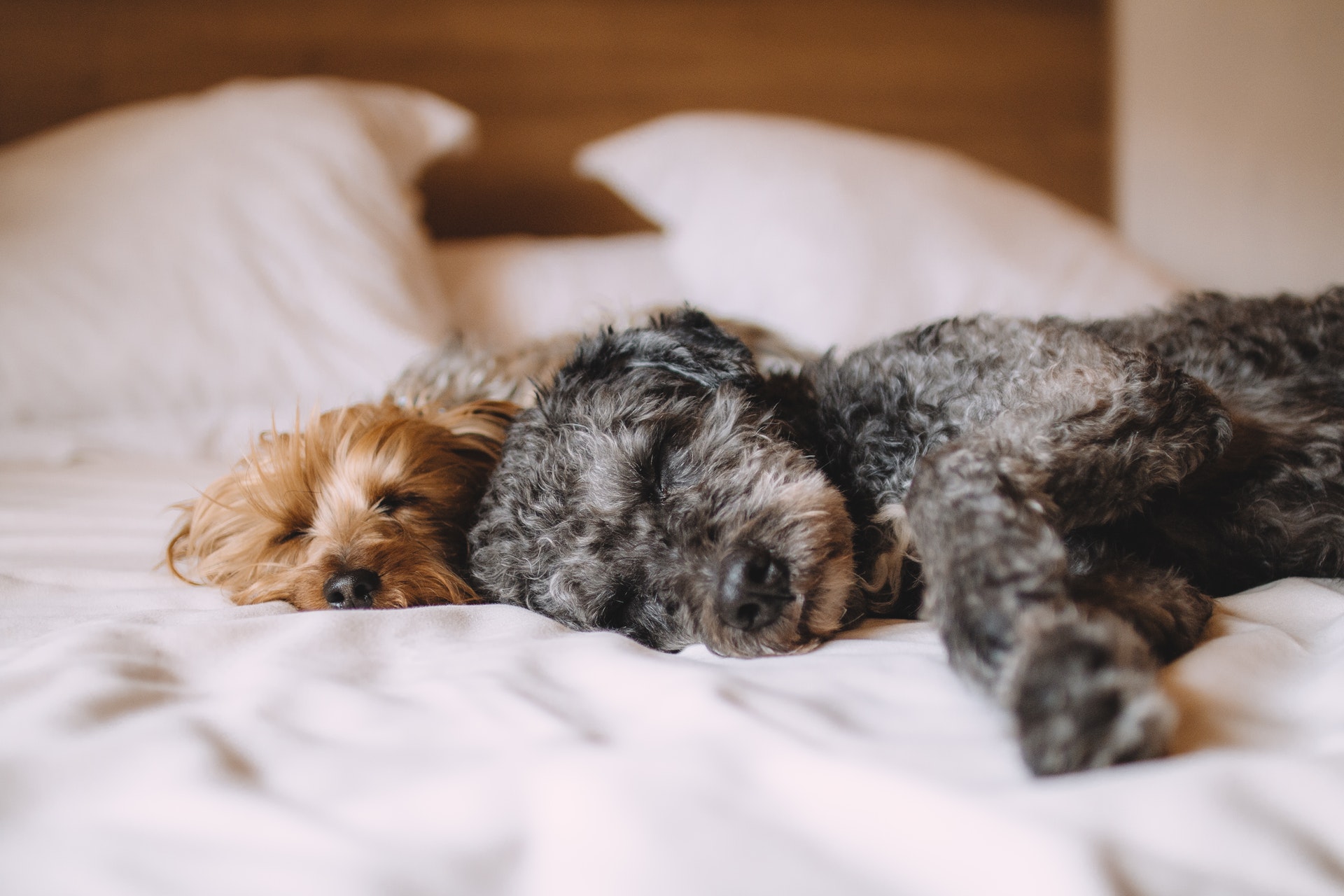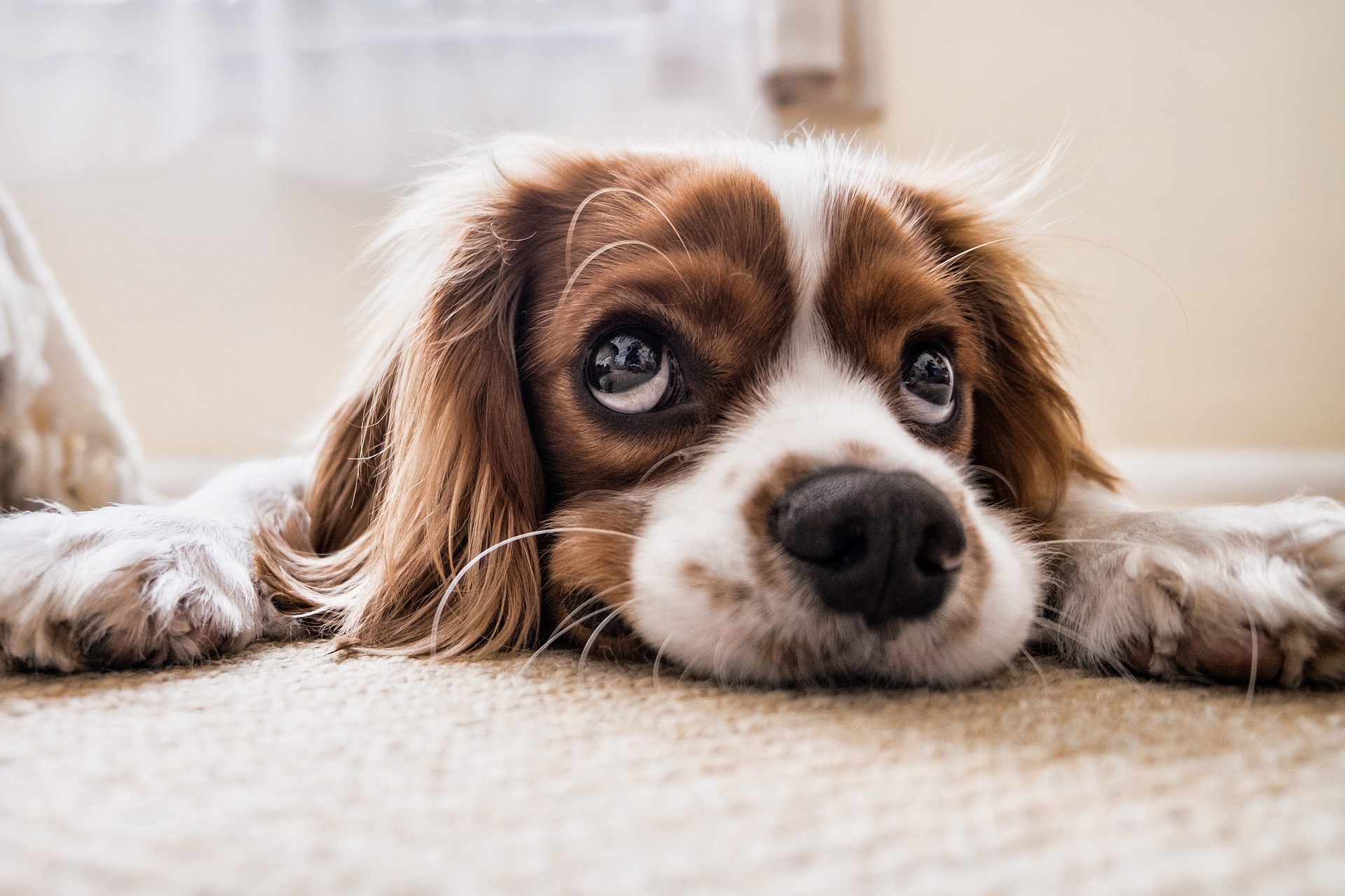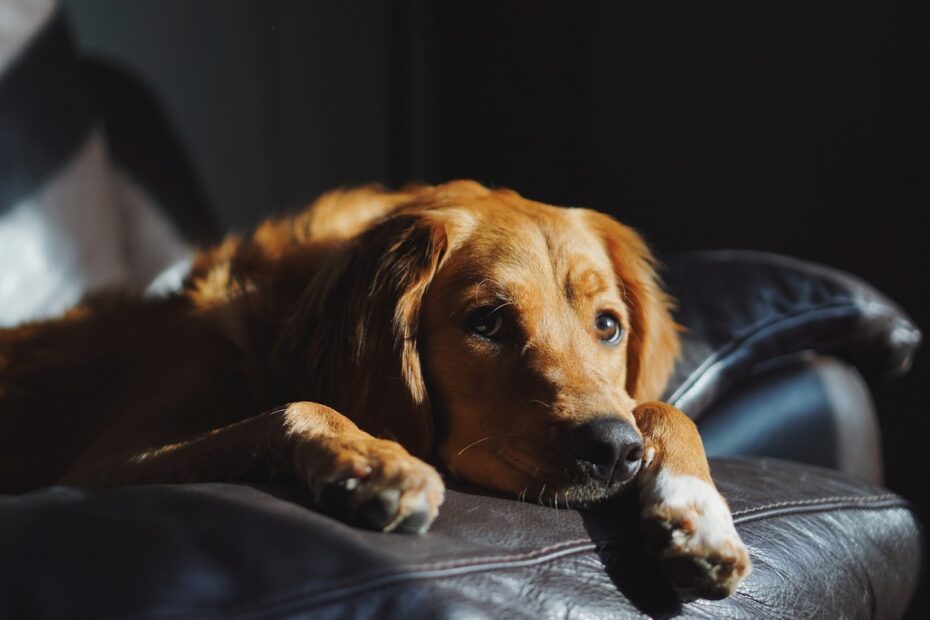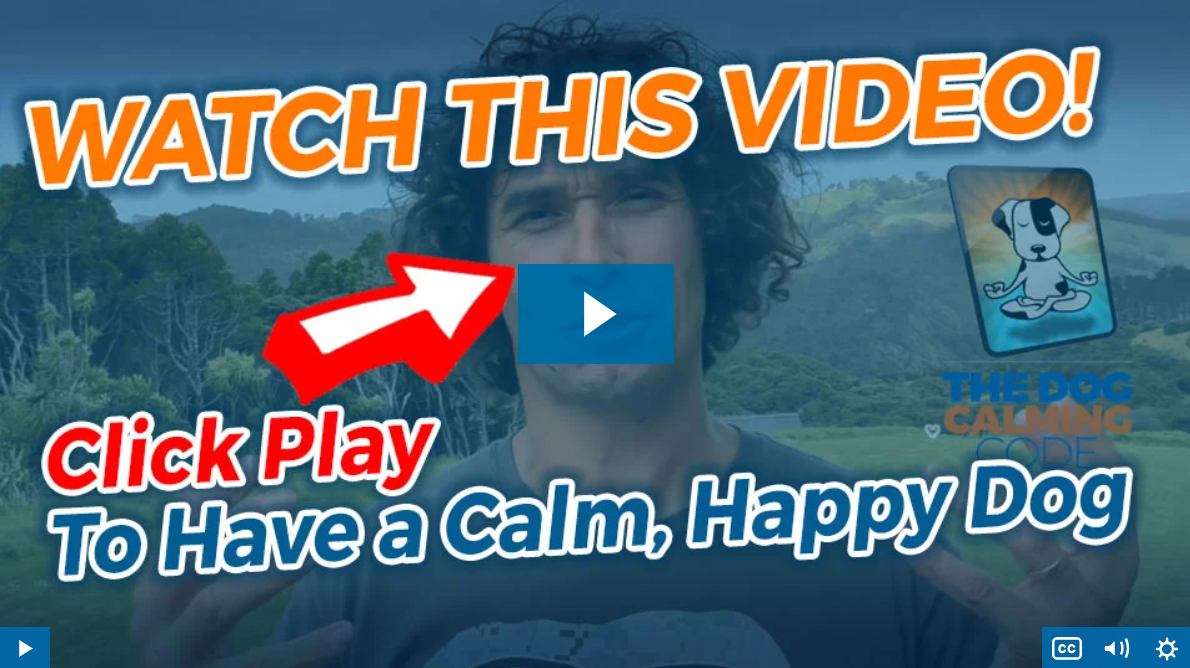If you want to learn how to calm an anxious dog at night, you’ve come to the right place.
Before we start looking at some of the common causes and solutions to nighttime anxiety, there’s one thing you should be aware of right off the bat…
You’re not alone.
Whatever problems you’re experiencing right now, you can bet there are hundreds of thousands of other dog owners going through the exact same thing. Because whatever else nighttime anxiety is, it’s not rare.
Take heart in knowing your dog isn’t the only pooch in town that passes the twilight hours pacing, fretting, whining, and generally doing everything other than sleep.
There’s comfort in numbers, especially when large swathes of those numbers have navigated the experience with their sanity intact.
But I get it…. regardless of how many other people are experiencing the same issues, that knowledge alone doesn’t bring you any closer to resolving your own.
Fortunately, there’s a very real, very effective way you can start getting to grips with your dog’s nerves straight away.
It’s called the Dog Calming Code, and it’s a program that’s been put together by Dan Abdelnoor over at the Online Dog Trainer to help any dog, no matter how much of a nervy nelly they are, to calm down, wise up, and become the masters of their own emotions.
If you want to transform your panicky pooch into a model of serenity, check out the video link below:
(video will open in new window)
Why Is My Dog So Anxious At Night?
Some dogs are the picture of restraint during the day. They listen to your commands, they listen to your instructions, they’re polite with guests, calm with kids, and only give the mailman a fright if they’re feeling particularly frisky.
But then night comes around, and suddenly, all bets are off. Dr. Jekyll transforms into Mr. Hyde, barking, wailing, ripping up the furniture, pacing endlessly, and generally doing everything in their power to keep everyone in a 5-mile radius from getting a wink of sleep.
There’s no doubt about it. Nighttime anxiety can be extremely destructive and incredibly disturbing.
But what exactly causes it?
Changes
Dogs are creatures of habit. They like routine, and they’d prefer things to stay as constant and unchanging as possible. What they don’t like is unexpected changes.
If something’s knocked the wind out of their sails (a new baby, a loss of a family member, a new home, etc), they might display some small, occasional signs of anxiety during the day.
When the lights go out, those small anxieties can bubble over into pacing, constant repositioning, and outright signs of distress.
Lack of Activity
Even dogs with low activity demands still need to have those demands met. If they’re not getting enough opportunities during the day to burn off their energy, it’s going to build up till it explodes.
When it does, expect destructive behavior through the day and constant fretting and pacing through the night.
Separation Anxiety
Canine separation anxiety can manifest itself in a multitude of ways, including nighttime anxiety. Dogs are incredibly social creatures by nature and can form astonishingly fast bonds with their owner.
It’s a big part of why we love them, but it can also be a big problem if those bonds are too strong for their own good.
Dogs with unusually strong attachments to their owners can get extremely miserable and stressed if they’re parted from them, even if only for a few minutes.
Some breeds are more susceptible to separation anxiety than others, with smaller breeds being especially sensitive. Rescue dogs or pet store pups who had a troubling start to life are also vulnerable.
A change in routine or circumstances (a new home, new neighborhood, a change in your schedule, a loss of a family member, etc.) can be enough to trigger separation anxiety in almost any dog.
You might think separation anxiety only happens if you leave your dog at home alone. But some dogs will get anxious simply being in another room to you.
If you’ve barred them from your bedroom during the night, their inability to be near you is likely to set them on an emotional rollercoaster.
Common symptoms include scratching or pawing at doors to try and get to you, crying and whining in distress, pacing, destructive behaviors, and even attempts at self-harm.
Related: How To Calm A Dog With Separation Anxiety In 3 Simple Steps

Aging
When dogs get older, their mental powers and reasoning abilities can, like ours, take a downward turn.
Around half of all dogs over the age of 11 are likely to show symptoms of Cognitive Dysfunction Syndrome (CDT), a progressive condition that leads to a deterioration of the brain’s functional abilities.
During the day, dogs with CDT can seem vague, confused, or simply sleep their way through most of it. However, when night comes, their confusion can intensify, leading to barking, wandering, and disturbed pacing.
If they’re also experiencing age-related sight or vision loss, the problems can be magnified as they bump into furniture or get lost, even in familiar surroundings.
Immaturity
Older dogs aren’t the only ones that can suffer nighttime anxiety. Young puppies who suddenly find themselves separated from their litter buddies can get anxious and lonely, resulting in whining, pacing, and precious little sleep for either you or them.
If they’re crated and put in a room by themselves, they can get even more miserable.
Crate Issues
Crates can be an incredibly helpful tool. From helping with potty training to giving your dog a peaceful place to retreat to, their benefits are numerous, well documented, and by and large, not overstated.
The problem is, not every dog likes them. Some dogs dislike them so much, they can get stressed and anxious at the very sight of them.
Usually, the problem happens if they’ve had a poor experience in a crate in the past.
Pet shop pooches, for example, can be squeezed in ten to a crate, leading to cramped, stressful conditions and a lifetime of crate aversion.
Problems can also arise if their introduction to the crate was too rushed or if it’s simply not comfortable. If it’s in a direct source of heat, positioned in a noisy part of the house, or too far away from where the family tends to hang out, for example.
Related Post: 4 Ways To Stop Your Puppy Whining In The Crate – The Quick & Easy Way

How to Calm an Anxious Dog at Night
There’s no getting around the fact that nighttime anxiety can be extremely distressing, both for your dog and the rest of the family. Fortunately, there’s plenty of ways you can reduce your dog’s anxiety and restore some peace to their nights.
Before we start looking at some of the strategies you can try, be sure to check out the Dog Calming Code over at the Online Dog Trainer.
As a way to help your dog take control of their emotions and calm down, it’s unbeatable.
After that, you can get to work on the following tips and techniques.
Figure it Out
Tempting though it is to jump in all guns blazing, don’t. Unless you know what’s causing your dog’s anxiety, you’ll struggle to tackle it.
The first step is to get them checked over by a vet. Muscular pain, sensory changes, Cognitive Dysfunction Syndrome, and certain other medical conditions can all give rise to unusual nighttime behaviors.
If they get the all-clear, you can start thinking about things like…
- Do they bark and become stressed and destructive whenever you leave them alone? …If so, they may be suffering from separation anxiety.
- Did their nighttime anxiety start after a change in their routine or in their environment? …If it did, they may be feeling stressed and anxious as a result of the changes.
- Do they start showing signs of anxiety and stress as soon as they go into their crate? …If yes, it could be the crate that’s the problem.
- Are they a young pup that’s only recently been separated from their mother? …If they are, they could be feeling lonely and scared.
Think as much about the context and the circumstances surrounding your dog’s behavior as you can. The more insight you have into their anxiety, the easier it’ll be to address.
Make Some Changes
Behavioral management techniques will help address the underlying causes of your dog’s anxiety. But in the meantime, making small, practical changes to their environment can help diffuse their anxiety and calm them down.
Consider installing a night light near their sleeping area so they can orientate themself when they wake up. Although it’s helpful for dogs of all ages, it’s especially important for older dogs with cognitive or sensory impairment.
Adding some of your unwashed clothing to their bed can increase feelings of comfort and familiarity. You could also try using plug-in pheromone diffusers to help ease any anxious feelings.
Swapping their bed for something thick and high-sided can add to their feelings of security, as can letting them sleep in your bedroom.
If you’re not comfortable with them sleeping in there forever, start by laying their bed close to your own. Over time, very slowly begin moving it a little further toward the door until it’s eventually on the other side.

Add Some Exercise
If your dog is good and tuckered by the time they hit the hay, there’s a better chance they’ll sleep through the night without getting restless and anxious.
If they’re young and otherwise healthy, work out exactly how much exercise they need for their breed and give it to them. If it’s not enough to counter their nighttime behavior, given them some more.
Older dogs with CDS are known to get restless at night, but a gentle evening stroll can help reduce nighttime wandering. If they suffer from arthritis, swimming can provide them with a very effective form of gentle exercise.
If their health won’t allow for much physical exercise, swap physical stimulation for the mental kind with puzzle toys, food games, activity balls, and puzzle toys.
Try Some Simple Behavior Modification
Separation anxiety, which is at the root of many incidences of nighttime anxiety, is a complex condition that will often need extensive, professional assistance to cure.
There are, however, some simple behavioral modification techniques you can use to lessen its severity and help your dog become more self-assured.
Start by teaching them the basic “sit” and “stay” commands. Once they’ve mastered them, keep them in a sit/stay position for a couple of minutes. Reward them at the end of it with treats and gentle praise.
Next, start working on building up their confidence when they’re alone.
Start leaving the room for a few minutes after instructing them to stay. When you return, reward them.
Gradually work on extending each absence. To help them adjust, a treat-dispensing toy can serve as a useful distraction.
Again, use the Dog Calming Code to help keep them focused and in the zone as they learn to master their new skills.
Socialize Them
Another way to help increase your dog’s confidence is through socialization. Work on gently increasing their exposure to different places, people, animals, sounds, and situations, remembering to use treats and praise to grease the wheels.

Wrapping Things Up
If your dog has CDS, medication should help alleviate their symptoms.
However, if their nighttime behavior is the result of separation anxiety or other mental issues, you’ll need to focus on reducing their anxiety through behavioral modification and practical changes.
Canine pheromones, training, a nightlight, a change in sleeping arrangements, and plenty of exercise can all help enormously. Stay bright and breezy (remember, the more you focus on their anxieties, the worse they’ll become), and most of all, stay patient.
It may take some time, but the vast majority of nighttime anxiety issues can be overcome.

